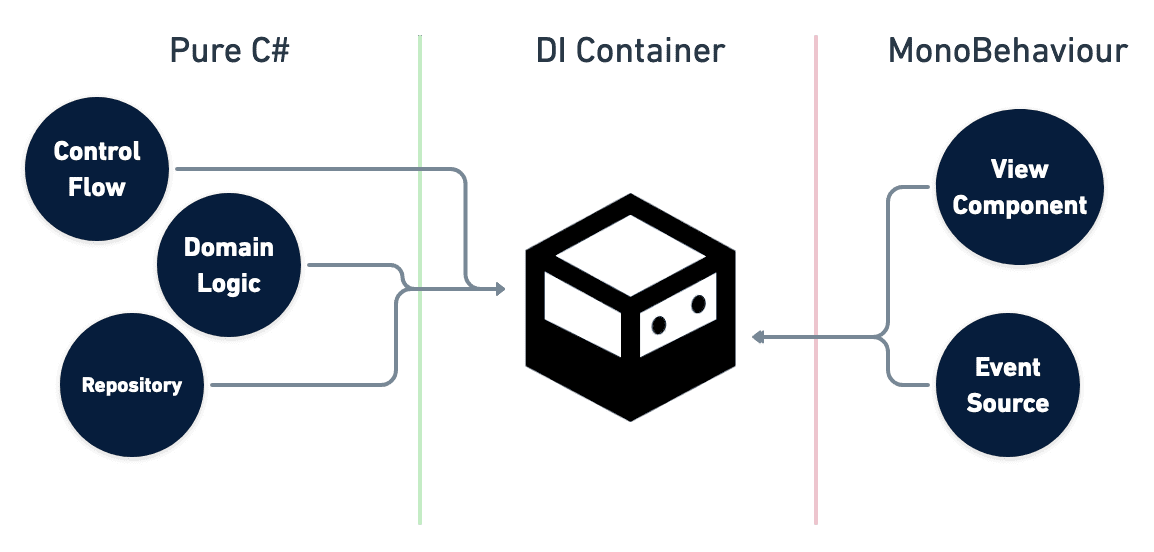VContainer
VContainerは Unity(ゲームエンジン)上で動作する高速なDIフレームワークです。(DI = Dependency Injection のこと。)
"V" は、Unity の頭文字 "U" を 鉛筆削りで鋭く削ってスリムにした形状をイメージしています。
- 高速なResolve: Zenjectとの比較でおよそ 5-10倍の性能 。
- GCにやさしい: オブジェクト解決時 ゼロアロケーション 。(生成したインスタンス自身を除く)
- コンパクトなサイズ: internal 型や .callvirt 命令とかも少ない。ビルドサイズにやさしい。
- 過不足のない機能: シンプルで透明性のあるAPI。過度に複雑で理解し難い設定を避けます。
- イミュータブルなコンテナ: 一度コンテナをつくったら遅い処理がほとんどない。スレッドセーフ。
主な機能#
- コンストラクタ インジェクション / メソッド インジェクション / プロパティ & フィールド インジェクション
- PlayerLoopSystem上への 独自C#型のスケジュール
- 柔軟なスコープ生成
- ILコード生成による最適化
- UniTask連携
- ECS連携 beta
DI + Inversion of Control for Unity#

通常、Unityは MonoBehaviour を継承したクラスのみを処理の起点にできますが、VContainerを用いることでオブジェクト同士の参照関係/所有関係を自由に構築したり、純粋なC# クラスのエントリポイントをつくることができます。これはUnityのコンポーネントに依存する部分・見た目の部分と、その他純粋なロジックを分離する設計の手助けになります。
このような制御の反転はIoC(Inversion of Control) などと呼ばれていて、DIコンテナの設計上の利点のひとつです。
- くわしくは:
- 合わせて読みたい:
パフォーマンス#
Benchmark result for 10,000 iterations for each test case (Unity 2019.x / IL2CPP Standalone macOS)#
- デフォルトでは、VContainerやZenjectはDIのために実行時のリフレクションを使います。
- "VContainer (CodeGen)" は コンパイル時 IL コード生成による高速化モード時の性能です。
GC Alloc result in the Resolve Complex test case (Unity Editor profiled)#
基本の使い方#
VContainerを使うには、最初にスコープを表現するコンポーネントを作成します。設定をC#コードで記述することで、自動的にオブジェクト同士の参照が組み立てられます。
public class GameLifetimeScope : LifetimeScope{ public override void Configure(IContainerBuilder builder) { builder.RegisterEntryPoint<ActorPresenter>();
builder.Register<CharacterService>(Lifetime.Scoped); builder.Register<IRouteSearch, AStarRouteSearch>(Lifetime.Singleton);
builder.RegisterComponentInHierarchy<ActorsView>(); }}クラス定義の例)
public interface IRouteSearch{ /* ... */}
public class AStarRouteSearch : IRouteSearch{ /* ... */}
public class CharacterService{ readonly IRouteSearch routeSearch;
public CharacterService(IRouteSearch routeSearch) { this.routeSearch = routeSearch; }}public class ActorsView : MonoBehaviour{ // ...}public class ActorPresenter : IStartable{ readonly CharacterService service; readonly ActorsView actorsView;
public ActorPresenter( CharacterService service, ActorsView actorsView) { this.service = service; this.actorsView = actorsView; }
void IStartable.Start() { // VContainerのPlayerLoopSystemが`Start`を呼び出します。 }}- この例では、
CharacterServiceのrouteSearchが自動的にAStarRouteSearchのインスタンスとして設定されます。 - エントリポイントとして登録した
ActorPresenterは,Unityのライフサイクル上にスケジュールされます。 - くわしくは:
動的なスコープ生成と非同期#
LifetimeScopeは、動的に子スコープを作ることができます。ゲームでよく発生する非同期のリソース読み込みに対応できます。
public void LoadLevel(){ // ... 追加のアセットを実行時に読み込んだりする ...!
// 子スコープ作成の例 instantScope = currentScope.CreateChild();
// 特定のプレハブを使用した子スコープ作成の例 instantScope = currentScope.CreateChildFromPrefab(lifetimeScopePrefab);
// 追加でインスタンスを登録した子スコープ作成の例 instantScope = currentScope.CreateChildFromPrefab( lifetimeScopePrefab, builder => { // Extra Registrations ... });
instantScope = currentScope.CreateChild(builder => { // ExtraRegistrations ... });
instantScope = currentScope.CreateChild(extraInstaller);}
public void UnloadLevel(){ // スコープの破棄 // コンテナが管理しているオブジェクトもDisposeされる instantScope.Dispose();}また、追加のUnityシーンをAdditiveで読み込む際に、LifetimeScopeの親子関係を作ることもできます。
class SceneLoader{ readonly LifetimeScope currentScope;
public SceneLoader(LifetimeScope currentScope) { currentScope = currentScope; // Inject the LifetimeScope to which this class belongs }
IEnumerator LoadSceneAsync() { // LifetimeScope generated in this block will be parented by `this.lifetimeScope` using (LifetimeScope.EnqueueParent(currentScope)) { // If this scene has a LifetimeScope, its parent will be `parent`. var loading = SceneManager.LoadSceneAsync("...", LoadSceneMode.Additive); while (!loading.isDone) { yield return null; } } }
// UniTask example async UniTask LoadSceneAsync() { using (LifetimeScope.EnqueueParent(parent)) { await SceneManager.LoadSceneAsync("...", LoadSceneMode.Additive); } }}// LifetimeScopes generated during this block will be additionally Registered.using (LifetimeScope.Enqueue(builder =>{ // Register for the next scene not yet loaded builder.RegisterInstance(extraInstance);})){ // Loading the scene..}- くわしくは:
UniTask#
async UniTask なメソッドを処理の起点にすることもできるようになっています。
public class FooController : IAsyncStartable{ public async UniTask StartAsync(CancellationToken cancellation) { await LoadSomethingAsync(cancellation); await ... ... }}builder.RegisterEntryPoint<FooController>();- くわしくは: